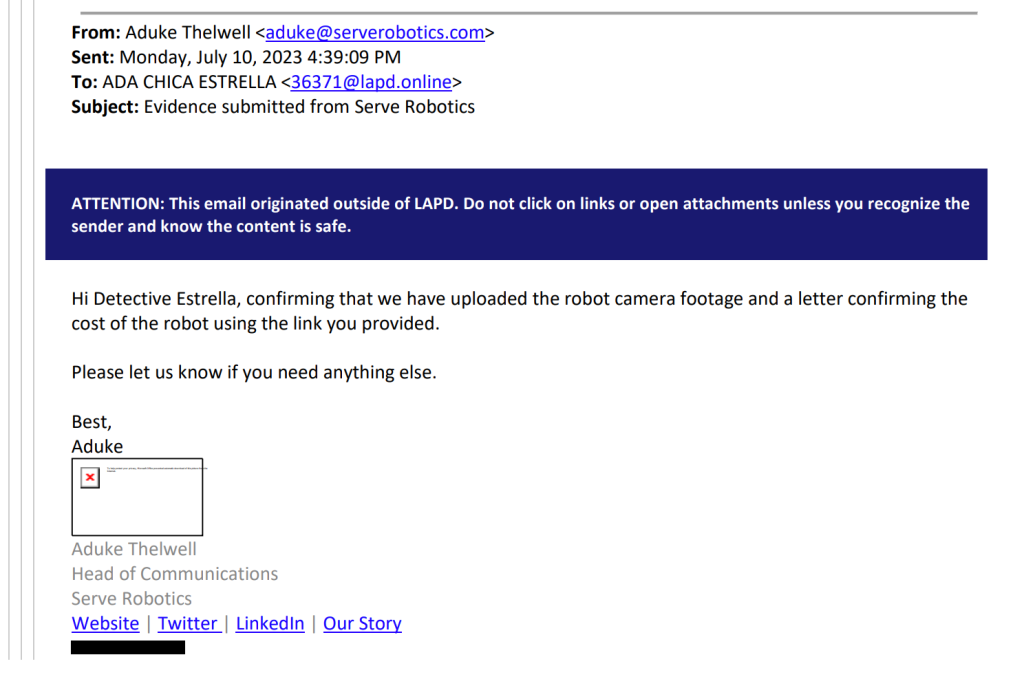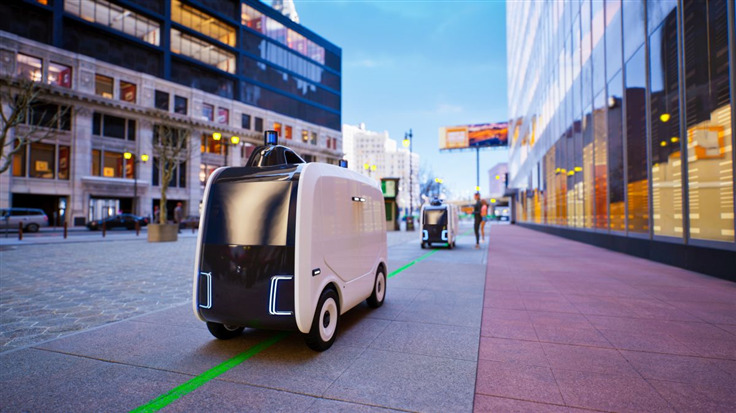In what sounds like a new step towards Skynet, footage from a food delivery robot has been used as part of a criminal investigation.
As 404 Media reports, the food delivery robots that are deployed for Uber Eats in Los Angeles are operated by Serve Robotics, which ultimately wants to deploy up to 2,000 robots. These robots are autonomous, although remotely supervised.
In emails obtained by 404 Media, the news outlet learned that Serve Robotics uploaded robot camera footage in a grand larceny case where two men tried to steal one of its robots. Based on the footage, the suspects were arrested and convicted.

image courtesy of 404 media
Serve Robotics mentioned the incident in a blog about how its robots make use of public resources. In this blog it states;
“This [trust] principle also means not using robots for surveillance or other purposes that violate the public’s sense of privacy, and upholding strict data policies that do not undermine privacy.”
The first time I read about the case, I must admit I shrugged as well. It seems reasonable that the company would provide evidence in a case where their own property was involved. However, what’s more worrying is that 404 Media has learned that Serve Robotics wants to work more with the LAPD, who are no doubt excited by the opportunity to have additional eyes moving around the city.
In the same blog, Serve Robotics states:
“And when it comes to engaging law enforcement in rare instances of robot vandalism or attempted theft, our policy is to report to police any violent incidents or serious criminal conduct that may put public safety at risk (e.g., organized crime, use of weapons, etc.).”
Serve Robotics handing over video evidence from a single Uber Eats delivery does not represent a widespread surveillance network. In fact, the company’s policy is to routinely delete video captured by robots during their delivery work except when “compelling safety or security concerns” exist.
The privacy policy of the company that operates the robots, unsurprisingly, focuses on its customers. It doesn’t mention the people that might be filmed by a robot they happen to encounter on the streets.
But one thing history has taught us is that eventually most computer vision will be used for surveillance purposes against human beings. The Electronic Frontier Foundation has already warned about the impending privacy threat brought about by self-driving cars.
“The sheer amount of visual and other information collected by a fleet of cars traveling down public streets conjures the threat of the possibility for peoples’ movements to be tracked, aggregated, and retained by companies, law enforcement, or bad actors—including vendor employees. The sheer mass of this information poses a potential threat to civil liberties and privacy for pedestrians, commuters, and any other people that rely on public roads and walkways in cities.”
The EFF mentions at least nine warrants served to a self-driving car company and calls for strong privacy laws that address both the personal data that the cars process and police access to that data. Combined with the robots and all the static cameras, that makes for a whole lot of eyes watching us in the streets. And as we learned from our most recent episode of Lock and Code, cars are not just spying on people outside of the car.
This growing fleet of moving eyes combined with already present static ones, are posing a serious threat to our privacy. Basically, we are—justifiably—pointing a finger at totalitarian regimes that are constantly monitoring their population, while at the same time we are allowing commercial parties with privacy policies that are designed to defend themselves in court, to spy on us and hand over the gathered information to law enforcement.
We are not capable of sending someone back to the past to rectify these developments, so we need to act now if we don’t like what on the privacy horizon.
We don’t just report on threats—we remove them
Cybersecurity risks should never spread beyond a headline. Keep threats off your devices by downloading Malwarebytes today.











